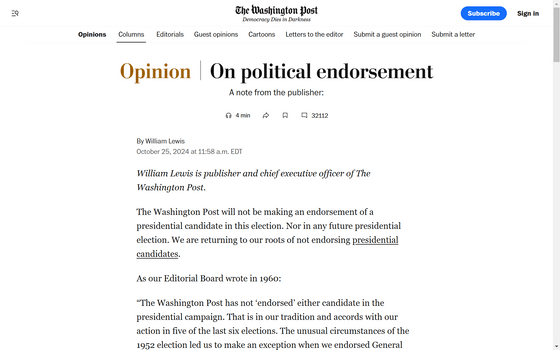It has been revealed that Amazon founder Jeff Bezos has been lobbying the Washington Post, which he owns, not to publish articles in support of Kamala Harris

By
On October 25, 2024, the Washington Post, a leading American newspaper, announced that it would not support any particular candidate in the upcoming US presidential election on November 5, 2024. According to the Washington Post, it had prepared an article supporting Democratic candidate Kamala Harris, but was told not to publish it at the direction of Jeff Bezos, founder of Amazon, who acquired the Washington Post in 2013 and became its owner.
Opinion | On political endorsement - The Washington Post
https://www.washingtonpost.com/opinions/2024/10/25/washington-post-endorsement/

The Washington Post will not endorse a candidate for president - The Washington Post
Jeff Bezos killed Washington Post endorsement of Kamala Harris
https://www.cnbc.com/2024/10/25/jeff-bezos-killed-washington-post-endorsement-of-kamala-harris-.html
The Washington Post has published articles supporting Democratic candidates in U.S. presidential elections since 1976. In the 2016 and 2020 presidential elections, the Post also published editorials supporting Democrats Hillary Clinton and Joe Biden over Republican candidate Donald Trump.
In the US presidential election to be held on November 5, 2024, The Washington Post had drafted an article supporting Democratic candidate Harris and was preparing to publish it. However, on October 25, 2024, The Washington Post published an article claiming, 'We are not endorsing any particular presidential candidate in this election, and we plan to take similar measures in future presidential elections. We are returning to our origins of not endorsing any particular presidential candidate.'
The 'origin' that the Washington Post refers to is a statement issued by the editorial board of the paper in 1960 that reads, 'The Washington Post has not 'endorsed' either candidate in the presidential election. This is our tradition and is consistent with our actions in five of the past six elections. In the 1952 election, unusual circumstances led us to make an exception and endorse Eisenhower before the nominating convention and to reiterate our endorsement during the campaign. In retrospect, we believe that the arguments for Eisenhower's nomination and election were compelling, but in hindsight we also believe that, as an independent newspaper, it may have been wise to avoid a formal endorsement.' This spirit of 'origin' continued for a while, but in 1976, for reasons that the Washington Post said were 'understandable at the time,' it was changed and the paper endorsed Jimmy Carter for president.
This marks the first time in 36 years , since 1988, that The Washington Post has not endorsed a presidential candidate.
The Washington Post also quoted two anonymous people as saying, 'The decision not to publish articles endorsing a particular presidential candidate was made by The Washington Post's owner, Jeff Bezos.'
On the other hand, Washington Post CEO Will Lewis denied that Bezos had interfered in the publication of the endorsements, saying, 'There have been inaccurate reports about Mr. Bezos' role as owner of The Washington Post and its decision not to run articles about presidential candidates he supports. Mr. Bezos had no say in the publication of the endorsements. As an independent newspaper, we believe we should support our readers' ability to decide for themselves which presidential candidate to vote for.'
'We recognize that our decision may be perceived as a tacit endorsement of one candidate, a condemnation of another, or an abdication of responsibility -- this is inevitable,' Lewis said. 'We believe our decision is consistent with what a president should do: show character and courage in the service of American ethics, respect for the rule of law, and respect for human liberty everywhere.'

However, many readers have responded to this decision with negative comments, including harsh opinions such as, 'The most important election in our country, which will decide whether we should choose fascism or democracy, is about to take place and you are just going to sit back and watch? The Washington Post is unethical and a terrible coward,' and 'The Washington Post prioritizes business over ethics and morality. In light of this decision, I will be canceling my subscription.'
The Washington Post has traditionally separated its daily news and election-related opinion pieces, but this decision has caused upheaval among many of its opinion staff, and it has also been reported that The Post's editor-in-chief, Robert Kagan, has resigned in protest of the decision.
The Washington Post Guild, a labor union representing The Washington Post staff, said, 'We are deeply concerned that The Washington Post, an American news organization, made this decision just 11 days before the most important election in history. The fact that the article about this decision was published by Lewis, not by the editorial board, strengthens our suspicions that Bezos and other management members may have interfered with the work of the editorial staff. This decision has led to a series of cancellations of subscriptions from readers. This decision not only erodes the trust of our readers, but also undermines the work of our staff.'
A statement from Post Guild leadership on the Washington Post's decision to not endorse a presidential candidate pic.twitter.com/fYU7hkr79K
— Washington Post Guild (@PostGuild) October 25, 2024
Rep. Ted Lieu, a Democrat from California, said of the decision, 'The first step to fascism is when a free press cowers in fear.'
The first step towards fascism is when the free press cowers in fear. https://t.co/6SjGYyxmR3
— Ted Lieu (@tedlieu) October 25, 2024
'This decision is an insult to those of us who have risked our careers and our lives to speak out for human rights and democracy,' said Washington Post columnist Karen Attiah.
At the time of writing, neither Bezos nor Amazon, of which he is the largest shareholder, have commented.
Related Posts:
in Note, Posted by log1r_ut







